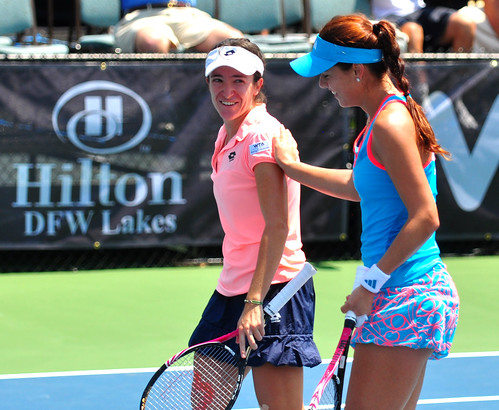Talking to Your Doubles Partners
Christy Vutam | June 29, 2012I’m always intrigued when opposing doubles teams huddle up. What are they saying? Have they picked up on my weaknesses? What are my weaknesses? Can they share my weaknesses with me so I can get better? Why are they still talking to each other when they’re down 6-0, 3-0? What could they possibly be strategizing about when we all know who’s going to win this match? Must they talk after every point? How have they not run out of tennis things to say to each other? Is it a bad thing that my partner and I don’t talk? Is it all for show? Is a team who talks after every point really that more in sync with each other than teams who don’t?
Do I lose in doubles because of my inability to play doubles or because I don’t talk to my partners?!
I’m jealous of this apparent chemistry. While the teammates across the net practically skip to each other’s sides after every point, my partner and I merely shuffle to our respective positions on the tennis court, ready for the next point and slightly annoyed at yet another delay. We don’t look at each other. We don’t acknowledge each other’s presence. We’re just two ships passing in the night. So close…yet so far away.
When I’m playing against foes who talk after every flipping point, I’ll get antsy. I want to look like a real doubles player, too! I’ll circle around to my startled doubles partner, make sure my back faces the other team so they can’t read my lips, and…ask my partner what her favorite movie is. I have yet to receive an actual movie title.
In my scientific research, I can educate you on what not to say. Doubles partners don’t like it when they think you’re criticizing them. Even when you’re using your friendliest tone and you think it’d be helpful to point out that, “Hey, let’s try not hitting the ball at the net person!” or “Hey, I think you might want to wear a bra with that outfit!” or “For the love of Hey-Zeus, will you just get the ball into the freaking court and stop trying to smash it?!” – they shockingly don’t care to hear it. You and your doubles partner just walk around ignoring the elephant on the court – their game – because that’s what civilized people do.
There is no surer way to trigger your partner’s defensive mechanisms than when you try to incorporate strategy. You tell this person one thing, and they immediately are determined to do the exact opposite. Adults! They’re just like teenagers! If you tell her to not hit the ball down the line – that’s not what I actually said. I said, “Let’s just keep the ball in play against these mature ladies because they can’t hurt us with their stick arms.” Not hitting down the line is implied, you see – she’ll keep wailing away at this most unfortunate choice of doubles strategy. It’s her game. It’s what she does. It’s who she is. How dare you try to stop her from being her!
Conversely, I honestly believe every time I tell my doubles partner to return the ball down the line because the net person is poaching like a crazy hyena, my partner hits that shot long to spite me, to prove a point – “don’t tell me what to do.” It happens way too many times – if not every time – for it to be a coincidence.
Doubles partners also don’t like it when you say out loud “KILL IT” before they hit an overhead. I know, right. Who knew?!
These types of comments seemingly created tension between my partners and me. It was puzzling. That’s when it hit me. I don’t want to create tension; I want to diffuse it! I want my partners to play freely, not tightly. So what I need to do is to lighten the mood and crack my partners up!
When you play with me now, you’ve no longer hit merely a “great” shot. You’ve hit a “sexy” shot. “Holy cow, that forehand was freaking beautiful!” “That putaway volley was so hot!” And on and on are the variations.
Go ahead. Try this on your partner the next time you play. Be as creative as you can. See how she responds. See if it makes your team play better.
It won’t. But, hey, at least you and your partner look like you guys are having fun and in sync with each other. That’s all that matters.
Photo: Thanks to: R Hensley in Flickr ©Creative Commons






